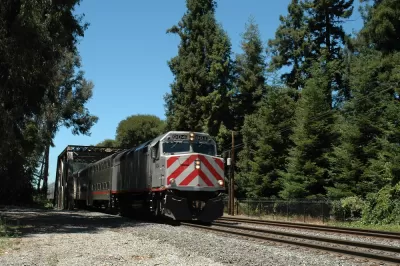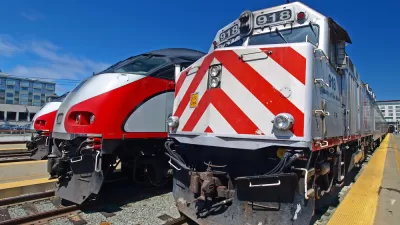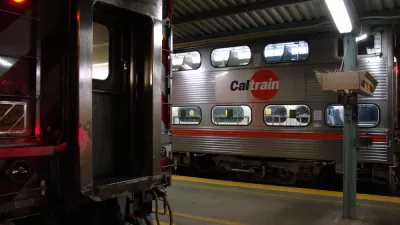A week ago, Secretary of Transportation Elaine Chao indicated she would not sign-off on the $647 million federal grant for the $2 billion Caltrain electrification project. On Monday, she changed her mind.

Back in February, California's GOP congressional delegation wrote the U.S. Department of Transportation asking them to delay a vital $647 million grant needed to electrify the 51-mile, San Francisco-to-San Jose commuter line on which 92 diesel-powered commuter trains operate daily. The reason: high-speed rail, a project they uniformly detest, would share the tracks.
It worked—Transportation Secretary Elaine Chao deferred signing the full funding federal grant agreement (FFGA).
While Congress directed the DOT to approve the electrification project and designated $100 million in the $1.1 trillion omnibus spending bill signed by President Trump on May 5, it was still contingent on Chao signing the FFGA. And last week, at a May 17 hearing of the Senate Environment and Public Works committee, she showed no change of mind, and referred back to the Republican delegation's letter for one of the reasons, reported Casey Tolan for The Mercury News.
“It is an issue I think the California delegation needs to come together and discuss, because there seems to be split opinions on this project.”
But on May 22, Chao saw the light, and "[l]ocal leaders applauded the decision," report Tolan and Katy Murphy for The Mercury.
“This is all the major holidays wrapped into one with a beautiful Caltrain bow around it," remarked Silicon Valley leadership Group CEO Carl Guardino.
Both the Silicon Valley Leadership Group and the Bay Area Council, another business group, were among the state's leaders, including Gov. Jerry Brown, the state's Democratic congressional delegation, and Bay Area elected officials that Jim Hartnett, General Manager and CEO of Caltrain, thanked in a statement.
“This is a win for everyone involved,” Sen. Dianne Feinstein, D-California, said in a statement. “Caltrain’s fleet of diesel trains are at the end of their useful life. Now is the time to replace these outdated, dirty diesel trains with a cleaner, modern electric fleet.”
On May 15, Senator Feinstein had warned that she would "oppose the confirmation of every Transportation Department nominee until the Trump administration funds California's electric train," reported the Los Angeles Times. But the next day, Jeffrey A. Rosen was confirmed as deputy secretary of U.S. Department of Transportation.
With Chao's signature, the aforementioned $100 million will be sent to Caltrain, and the remaining $547 million will be included in future Congressional appropriations.
As to why the change of heart, one can only speculate, but the reasons for approving it were evident from the get-go: It's a "shovel-ready" project producing almost 10,000 jobs throughout the United States, just the type of project that would fit into Trump's infrastructure plan.
Work in the corridor is set to begin this summer. Caltrain was forced to spend $20 million to extend contracts with engineering firms to June 30 after Chao deferred signing the FFGA in February, notes Samantha Weigel for the San Mateo Daily Journal.
Modernizing the rail line will nearly double ridership capacity to 110,000 and save an estimated 619,000 vehicle miles every day by removing cars off the increasingly congested Highway 101 and Interstate 280, according to Caltrain. It will also reduce commute times from San Jose to San Francisco by nearly 15 percent.
"The first electric trains are anticipated to be in service end of 2020 / early 2021," according to Caltrain. It's about time for the line that traces back to 1863.
FULL STORY: Feds approve grant for Caltrain electrification project

Study: Maui’s Plan to Convert Vacation Rentals to Long-Term Housing Could Cause Nearly $1 Billion Economic Loss
The plan would reduce visitor accommodation by 25,% resulting in 1,900 jobs lost.

Alabama: Trump Terminates Settlements for Black Communities Harmed By Raw Sewage
Trump deemed the landmark civil rights agreement “illegal DEI and environmental justice policy.”

Why Should We Subsidize Public Transportation?
Many public transit agencies face financial stress due to rising costs, declining fare revenue, and declining subsidies. Transit advocates must provide a strong business case for increasing public transit funding.

Paris Bike Boom Leads to Steep Drop in Air Pollution
The French city’s air quality has improved dramatically in the past 20 years, coinciding with a growth in cycling.

Why Housing Costs More to Build in California Than in Texas
Hard costs like labor and materials combined with ‘soft’ costs such as permitting make building in the San Francisco Bay Area almost three times as costly as in Texas cities.

San Diego County Sees a Rise in Urban Coyotes
San Diego County experiences a rise in urban coyotes, as sightings become prevalent throughout its urban neighbourhoods and surrounding areas.
Urban Design for Planners 1: Software Tools
This six-course series explores essential urban design concepts using open source software and equips planners with the tools they need to participate fully in the urban design process.
Planning for Universal Design
Learn the tools for implementing Universal Design in planning regulations.
Smith Gee Studio
Alamo Area Metropolitan Planning Organization
City of Santa Clarita
Institute for Housing and Urban Development Studies (IHS)
City of Grandview
Harvard GSD Executive Education
Toledo-Lucas County Plan Commissions
Salt Lake City
NYU Wagner Graduate School of Public Service




























